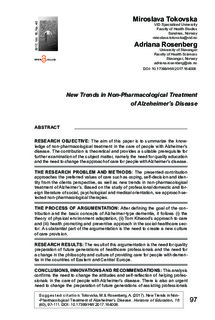| dc.contributor.author | Miroslava, Tokovská | |
| dc.contributor.author | Rosenberg, Adriana | |
| dc.date.accessioned | 2018-02-08T09:50:02Z | |
| dc.date.available | 2018-02-08T09:50:02Z | |
| dc.date.created | 2018-02-02T10:46:18Z | |
| dc.date.issued | 2017 | |
| dc.identifier.citation | Horyzonty Wychowania. 2017, 16 (40), 97-111. | nb_NO |
| dc.identifier.issn | 1643-9171 | |
| dc.identifier.uri | http://hdl.handle.net/11250/2483435 | |
| dc.description.abstract | The aim of this paper is to summarize the knowledge of non-pharmacological treatment in the care of people with Alzheimer’s disease. The contribution is theoretical and provides a suitable prerequisite for further examination of the subject matter, namely the need for quality education and the need to change the approach of care for people with Alzheimer’s disease. The presented contribution approaches the preferred values of care such as coping, self-decision and identity from the clients perspective, as well as new trends in non-pharmacological treatment of Alzheimer’s. Based on the study of professional domestic and foreign literature of social, psychological and medical orientation, we approach selected non-pharmacological therapies. After defining the goal of the contribution and the basic concepts of Alzheimer-type dementia, it follows (i) the theory of physical environment adaptation, (ii) Tom Kitwood’s approach to care and (iii) health promoting and preventive approach in the social-healthcare sector. A substantial part of the argumentation is the need to create a new culture of care provision. The result of this argumentation is the need for quality preparation of future generations of healthcare professionals and the need for a change in the philosophy and culture of providing care for people with dementia in the countries of Eastern and Central Europe. This analysis confirms the need to change the attitudes and self-reflection of helping professionals in the care of people with Alzheimer’s disease. There is also an urgent need to change the preparation of future generations of assisting professionals and further education in line with the latest research and knowledge on the provision of social and health care. | nb_NO |
| dc.language.iso | eng | nb_NO |
| dc.publisher | Jesuit University Ignatianum in Krakow | nb_NO |
| dc.subject | non-pharmacological treatment | nb_NO |
| dc.subject | Alzheimer’s disease | nb_NO |
| dc.subject | person centred care | nb_NO |
| dc.subject | personsentrert omsorg | nb_NO |
| dc.subject | ikke-medikamentell behandling | nb_NO |
| dc.title | New trends in non-pharmacological treatment of Alzheimer's disease | nb_NO |
| dc.type | Journal article | nb_NO |
| dc.type | Peer reviewed | nb_NO |
| dc.description.version | publishedVersion | nb_NO |
| dc.rights.holder | Open access | nb_NO |
| dc.source.pagenumber | 97-111 | nb_NO |
| dc.source.volume | 16 | nb_NO |
| dc.source.journal | Horyzonty Wychowania | nb_NO |
| dc.source.issue | 40 | nb_NO |
| dc.identifier.doi | 10.17399/HW.2017.164006. | |
| dc.identifier.cristin | 1561214 | |
| cristin.unitcode | 251,3,0,0 | |
| cristin.unitname | Fakultet for helsefag | |
| cristin.ispublished | true | |
| cristin.fulltext | original | |
| cristin.qualitycode | 1 | |
